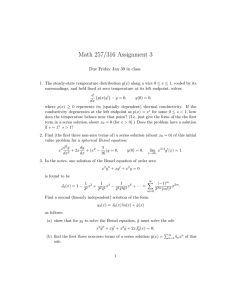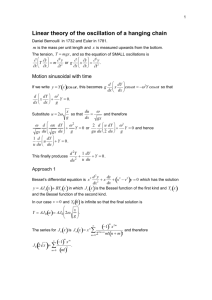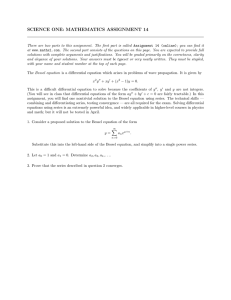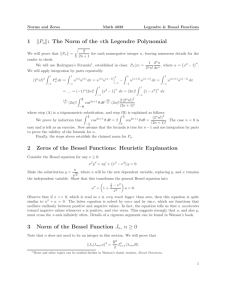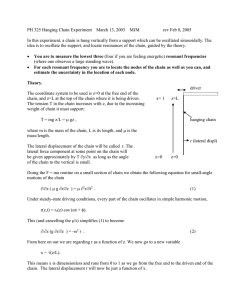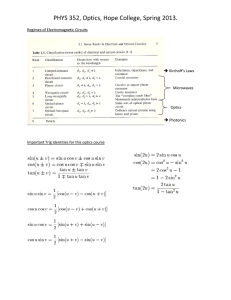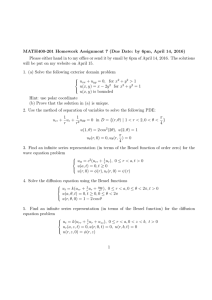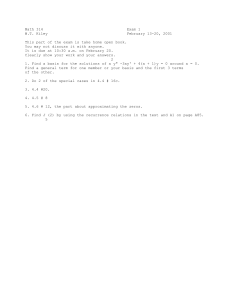Mini Tutorial MT-204
advertisement
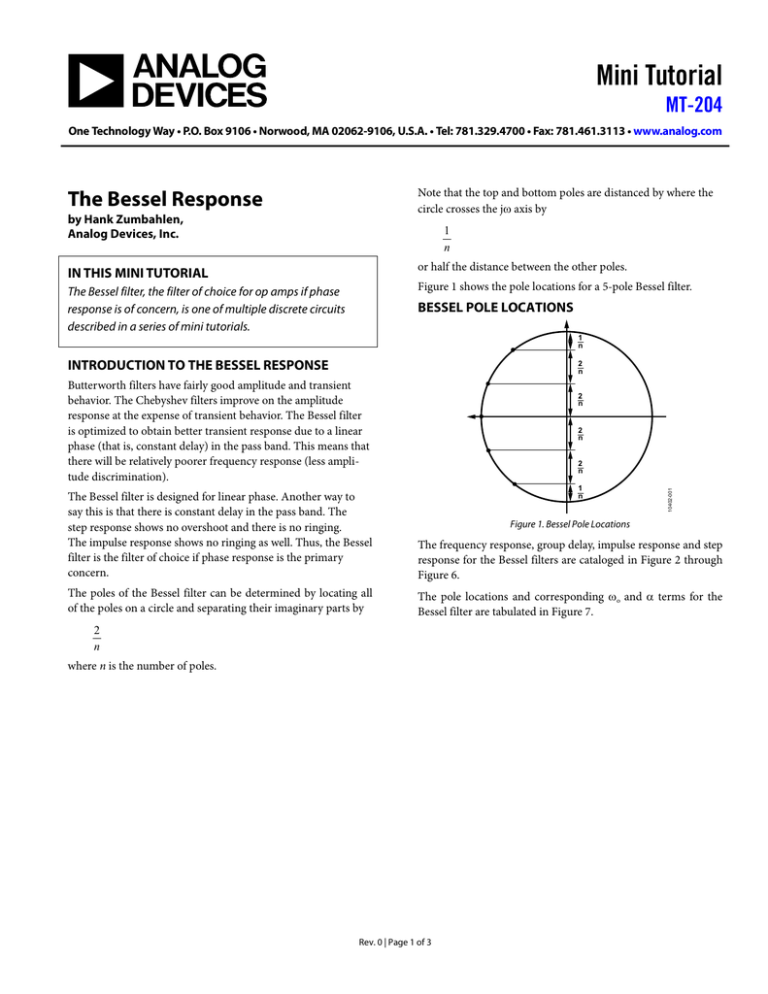
Mini Tutorial MT-204 One Technology Way • P.O. Box 9106 • Norwood, MA 02062-9106, U.S.A. • Tel: 781.329.4700 • Fax: 781.461.3113 • www.analog.com Note that the top and bottom poles are distanced by where the circle crosses the jω axis by The Bessel Response by Hank Zumbahlen, Analog Devices, Inc. 1 n or half the distance between the other poles. IN THIS MINI TUTORIAL Figure 1 shows the pole locations for a 5-pole Bessel filter. The Bessel filter, the filter of choice for op amps if phase response is of concern, is one of multiple discrete circuits described in a series of mini tutorials. BESSEL POLE LOCATIONS 1 n INTRODUCTION TO THE BESSEL RESPONSE 2 n Butterworth filters have fairly good amplitude and transient behavior. The Chebyshev filters improve on the amplitude response at the expense of transient behavior. The Bessel filter is optimized to obtain better transient response due to a linear phase (that is, constant delay) in the pass band. This means that there will be relatively poorer frequency response (less amplitude discrimination). 2 n 2 n 1 n 10402-001 2 n The Bessel filter is designed for linear phase. Another way to say this is that there is constant delay in the pass band. The step response shows no overshoot and there is no ringing. The impulse response shows no ringing as well. Thus, the Bessel filter is the filter of choice if phase response is the primary concern. The frequency response, group delay, impulse response and step response for the Bessel filters are cataloged in Figure 2 through Figure 6. The poles of the Bessel filter can be determined by locating all of the poles on a circle and separating their imaginary parts by The pole locations and corresponding ωo and α terms for the Bessel filter are tabulated in Figure 7. Figure 1. Bessel Pole Locations 2 n where n is the number of poles. Rev. 0 | Page 1 of 3 MT-204 Mini Tutorial BESSEL RESPONSE 0.6 –90 0.1 0.2 0.4 0.8 1.1 2.0 4.0 8.0 10 FREQUENCY (Hz) 0 0.1 0.4 1.1 4.0 10 FREQUENCY (Hz) Figure 2. Bessel Response, Amplitude 10402-005 DELAY (s) –50 10402-002 AMPLITUDE (dB) 0 Figure 5. Bessel Response, Group Delay 1.0 1.2 0.2 0.4 0.8 1.1 2.0 FREQUENCY (Hz) Figure 3. Bessel Response, Amplitude (Detail) 0 1 2 3 4 TIME (s) 5 10402-003 AMPLITUDE (dB) 4.0 0 0.4 0 0 1 2 3 4 TIME (s) Figure 6. Bessel Response, Step Response 8.0 –4.0 0.8 Figure 4. Bessel Response, Impulse Response Rev. 0 | Page 2 of 3 5 10402-006 –4.0 0.1 10402-003 AMPLITUDE AMPLITUDE (dB) 0 Mini Tutorial MT-204 BESSEL TABLE DESIGN Figure 7. Bessel Design Table Order 2 Section 1 Real Part 1.1050 Imaginary Part 0.6368 3 1 2 1.0509 1.3270 4 1 2 5 6 7 8 9 10 −3 dB Frequency 1.0020 F0 1.2754 α 1.7328 Q 0.5771 1.0025 1.4524 1.3270 1.4471 0.6910 1.4185 1.3270 1.3596 0.9877 0.4071 1.2476 1.4192 1.5912 1.9160 1.2414 0.5219 0.8055 0.9705 1 2 3 1.3851 0.9606 1.5069 0.7201 1.4756 1.5611 1.7607 1.5069 1.7745 1.0911 0.5635 0.9165 1.1876 1 2 3 1.5735 1.3836 0.9318 0.3213 0.9727 1.6640 1.6060 1.6913 1.9071 1.9596 1.6361 0.9772 0.5103 0.6112 1.0234 1.0638 1.4323 1 2 3 4 1.6130 1.3797 0.9104 1.6853 0.5896 1.1923 1.8375 1.7174 1.8235 2.0507 1.6853 1.8784 1.5132 0.8879 0.5324 0.6608 1.1262 1.2074 1.6964 1 2 3 4 1.7627 0.8955 1.3780 1.6419 0.2737 20044 1.3926 0.8256 1.7838 2.1953 1.9591 1.8378 1.9763 0.8158 1.4067 1.7868 0.5060 1.2258 0.7109 0.5597 1.1675 1 2 3 4 5 1.8081 1.6532 1.3683 0.8788 1.8575 0.5126 1.0319 1.5685 2.1509 1.8794 1.9488 2.0815 2.3235 1.8575 1.9242 1.6966 1.3148 0.7564 0.5197 0.5894 0.7606 1.3220 1.2774 1.5747 1 2 3 4 5 1.9335 1.8467 1.6661 1.3648 0.8686 0.2451 0.7335 1.2246 1.7395 2.2994 1.9490 1.9870 2.0678 2.2110 2.4580 1.9841 1.8587 1.6115 1.2346 0.7067 Peaking Frequency Peaking Level 0.7622 0.2349 1.1201 0.7768 1.3786 1.3851 1.5961 1.9860 1.7932 0.2011 2.5585 0.0005 0.7668 1.9632 0.0807 30949 1.0785 2.1291 0.2531 3.5944 1.5069 1.6853 1.3849 1.8575 0.5040 0.5380 0.6205 0.8100 1.4150 1.2685 1.4177 1.7848 REFERENCES Zumbahlen, Hank. Linear Circuit Design Handbook. Elsevier. 2008. ISBN: 978-7506-8703-4. REVISION HISTORY 2/12—Revision 0: Initial Version ©2012 Analog Devices, Inc. All rights reserved. Trademarks and registered trademarks are the property of their respective owners. MT10402-0-2/12(0) Rev. 0 | Page 3 of 3
